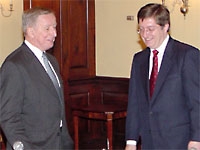
Dr. Antonio Gotto, dean of the Medical College, and Cornell University's 11th president, Jeffrey Lehman, at inaugural ceremonies at the Weill Cornell campus. Photo by Shonda Prince-Hall.
Jeffrey Lehman was inaugurated as Cornell University's 11th president during an unprecedented, transnational "Triple Inauguration" held at the Medical College, Cornell University (Ithaca campus), and Weill Cornell Medical College in Qatar (WCMC-Q), earlier last month. During the spectacular event, which spanned a week in October, President Lehman articulated his global vision for higher education, relating to the theme, "Cornell Celebrates a New Beginning."
In his talks, Lehman challenged higher education to provide fresh leadership in several areas, including health care. He reflected on the importance of institutional collaborations as well as Cornell's important role in transcending the boundaries of race and religion, among other significant topics.
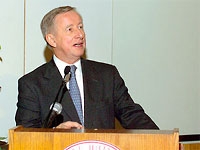
Dean Gotto speaks during the inaugural symposium in Uris Auditorium.
The inaugural events at Weill Cornell began with an early-morning breakfast in Uris Faculty Room, hosted by Dr. Antonio Gotto, dean of Weill Cornell Medical College. The breakfast featured remarks by New York City Mayor Michael Bloomberg; Sanford Weill, chairman of Weill Cornell's Board of Overseers; Peter Meinig, chair of the Cornell Board of Trustees; Dr. Rache Simmons, associate professor of surgery; Dr. Michael Kaplitt, assistant professor of neurological surgery at the Medical College and director of stereotactic and functional neurosurgery at NewYork-Presbyterian Hospital; and Medical College student Rafael Vasquez.
Before Lehman's talk in Uris Auditorium, Dr. Anthony Fauci, director of the National Institute of Allergy and Infectious Diseases, presented a riveting lecture on "Emerging and Re-Emerging Diseases of the 21st Century."
Following his address, President Lehman formally met with the press at a special luncheon briefing and then attended a private luncheon at Weill Cornell with presidents of other leading universities. Later, President Lehman highlighted Cornell University's ongoing community involvement with New York City at a special neighborhood tree-planting ceremony on Amsterdam Avenue, on the Upper West Side, and with a visit to the University's Cooperative Extension Office, located on 34th Street.
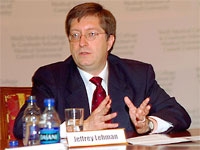
President Lehman at press briefing in the Uris Faculty Room. Photo by Robert Barker/Cornell University Photography.
In addition, inaugural events in Qatar marked an important milestone—the ribbon-cutting for the official opening of Weill Cornell Medical College's new location in Doha's Education City. And in Ithaca, President Lehman met with several community and national leaders, including U.S. Supreme Court Justice Ruth Bader Ginsburg, a member of the Cornell Class of 1954, who delivered remarks during Cornell University's inauguration ceremonies in Barton Hall.
Born in Bronxville and raised in White Plains as well as Bethesda, Maryland, President Lehman, 47, is the first Cornell alumnus to preside over the University. He is a highly regarded legal scholar, who, as dean of the University of Michigan Law School, rose to national prominence for his role in the recent historic Supreme Court decision in favor of affirmative action. Under Lehman's leadership, the University of Michigan Law School launched a range of successful initiatives in legal writing, public service, clinical education and transnational law. Lehman graduated from Cornell in 1977 with a bachelor's in mathematics. In 1981, he earned a law degree and a master's in public policy from the University of Michigan, graduating magna cum laude and also serving as editor-in-chief of the Michigan Law Review. He has also served as law clerk to Associate Justice John Paul Stevens of the U.S. Supreme Court, and he has practiced tax law in Washington, D.C.
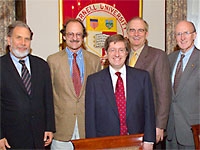
During a luncheon at the Medical College, President Lehman (center) poses with presidents from other leading universities and educational institutions. From left: John Sexton, New York University; Harold Varmus, MSKCC; Gregory Williams, City College of New York; and Robert Scott, Adelphi University. Photo by Robert Barker/Cornell University Photography. At Weill Cornell Medical College in Qatar (October 12, 2003)
Lehman took office as Cornell University's 11th president on July 1, 2003. Following are excerpts from his three inaugural addresses.
At Weill Cornell Medical College in Qatar (October 12, 2003)
"Here in Doha, Cornell is truly honored to be part of a remarkable enterprise. His Highness, the Emir, is bringing about an astonishing national transformation. His vision is truly inspiring: Constitutional democracy. Religious understanding. Shared economic prosperity. Full participation by all citizens.
"Weill Cornell Medical College in Qatar is designed to promote healing. Every day, the classes that are taught here will serve the cause of human health throughout the region by helping us to meet the challenges of disease. But I think it might also promote a different kind of healing as well.
"War and violence, hate and misunderstanding continue to scar our planet. I hope that the commitment to higher education that His Highness and Her Highness have shown in Qatar might become a model for the region, and for the world. We know that, at their best, universities are powerful engines of human transformation. Students and faculty from very different backgrounds are brought together, and through study and discussion, they come to view the world in new ways. Endeavors such as Education City can point the way to mutual respect, understanding, and peace, in ways that few other social institutions can."
At Weill Cornell Medical College (October 15, 2003)
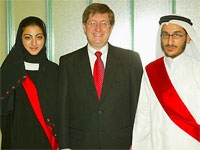
President Lehman with first-year WCMC-Q students Noor Al-Khori (left) and Saoud Al-Shamari at inaugural ceremonies in Qatar. Photo by Khaled Al-Marzooqi.
"Great universities help to advance scientific understanding of our world's unifying forces. In my remarks this morning, I would like to talk about how Cornell's leadership in the sciences is associated with a strong culture of intellectual collaboration. And I would like to talk about how that culture has spawned a longstanding and ever-expanding presence for Cornell in New York City.
"The work on this campus led to the first double-blind experiment to test the efficacy of pharmaceuticals. The work on this campus led to the first organic synthesis of penicillin. The work on this campus led to the Pap smear. The work on this campus led to the synthesis of oxytocin and a Noble Prize. And the inspiring history of the Medical College was made even more exciting by a series of developments around the time of the College's centennial.
"Cornell's presence in New York City began over 100 years ago because an intellectual imperative required us to locate our medical college here. Today, other intellectual imperatives have led Cornell to nurture an ever-expanding presence within the five boroughs that goes far beyond medicine and the life sciences.
"Cornell is in the workplace, advancing knowledge of alcohol, drug and health issues. Cornell is in union halls and corporate headquarters, helping organized labor and management increase their effectiveness. Cornell is in the South Bronx, working with community groups on new ways to reduce air pollution, and in Brooklyn, carrying out participatory research on sustainable agriculture with local gardeners. Cornell is in disadvantaged neighborhoods throughout the city, teaching young people reading, critical thinking and leadership skills. And Cornell is on Wall Street, developing innovative solutions to practical problems in computational and mathematical finance, portfolio optimization and risk management.
"New York City is an educational venue for our faculty and students, a research site and an intellectual and cultural resource, a central focus of our efforts in outreach and extension. I believe it is inevitable that in the decades ahead, the interdependence of our two New York campuses will continue to deepen, and that faculty and students who name the Ithaca campus as their primary base will spend more and more time in New York City."
At Cornell University, Ithaca (October 16, 2003)
"The creation of Cornell University forever changed the world of higher education. Today, when we look at the matter with both eyes, we see the vision of Ezra Cornell and Andrew Dickson White. In all of our nation's finest comprehensive research universities we see coeducation, nonsectarianism, racial diversity. We see theory and application, humanities and science explored with equal fervor and equal dignity.
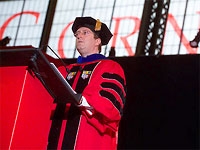
President Lehman delivers inaugural address in Barton Hall (Ithaca). Photo by Frank DiMeo/Cornell University Photography.
"Among the handful of truly superb comprehensive research universities in the world, Cornell embodies a unique history—bold and innovative, open and engaged, a community of universal aspiration and boundless contribution. The fearlessness of our founders has spawned a tradition of innovation and contribution to the well-being of humanity. The boldness of our founders has spawned a legacy of devotion in the hearts of those who studied here. In New York State, in Doha, Qatar, everywhere in the world, Cornell is the embodiment of dreams, a source of hope for the future of our species.
"Today, on this campus in Ithaca, let me express my belief that great universities must continue to promote the spiritually satisfying coexistence of people with one another and with our planet. The dividing lines of race and religion have long been especially powerful stimuli for conflict, mistrust, segregation and war. Scientific and technological progress have long challenged societal institutions to sustain humanistic and environmental values, even as they enhanced the quality of human life. I believe that universities have a special capacity to help students to be open to these challenges, to appreciate their complexity, and to engage them with all of the scientific, social scientific, and humanistic resources we can muster.
"I am humbled to have been called to serve as the eleventh president of Cornell University. In accepting the responsibilities of office today, I pledge to serve our university with all the ability that is mine to offer."

